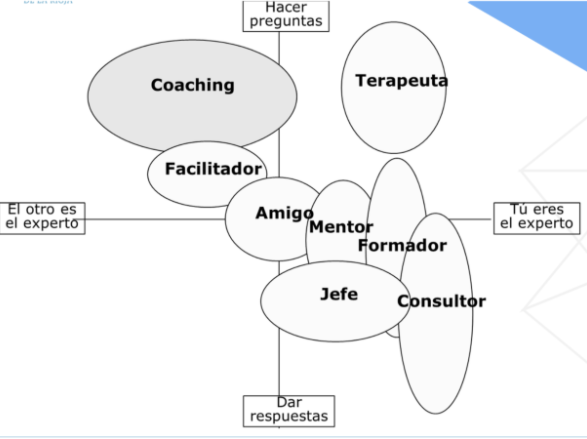DIFFERENT ROLES: MENTOR, TEACHER, CONSULTANT, ADVISOR, COUNSELLOR, ADVISOR, INVESTOR, EXPERT
A distinction must be made between the role of the mentor focused solely on assisting the entrepreneur of other professionals with particular commercial interests who approach the entrepreneur with a profit motive and with the idea of obtaining economic benefit.
The mentoring (+) that we practice at mentorDay is altruistic, not-for-profit, the moment the mentor receives money from the entrepreneur, he/she becomes another professional, changes function, acquires a different role that is neither better nor worse, it is simply different...
Normally, with more personal interest rather than interest in the entrepreneur, which is what we are looking for in the role of the mentor.
Therefore
- Mentoring is NOT direct sponsorship, it is selling services. The mentor who sells software or other services to the entrepreneur ceases to be a mentor and becomes a supplier interested in selling...
- The mentor is NOT someone who takes work away from the entrepreneur, i.e. if the mentor ends up working or subcontracted and paid in the entrepreneur's company, he/she acquires the role of a worker (with other particular interests) and ceases to be a mentor.
- It is not consultancy or free advice, The mentor does not provide solutions to problems, he or she makes sure that the entrepreneur learns how to find solutions by himself or herself, which is not the case with a consultant. It is not in the consultant's or advisor's interest for his client to acquire his skills, because it would no longer be necessary... The mentor acts from day one in the knowledge that his or her accompaniment is temporary.
- The mentor is NOT a business angel investor, the interests of the investor are to multiply what they have put into the entrepreneur's company and, to do this, the entrepreneur has to grow to need another round of financing where the investor can disinvest, sometimes, the entrepreneur is not interested in growing and as a mentor we have to recommend staying as he/she is and maintaining.
- Therefore, the interests of the mentor and the investor are different.
- The mentor is NOT an advisor who assumes responsibilities in the company, the mentor is never responsible for the decisions freely taken by the entrepreneur.
- Mentoring is NOT the teaching of a teacher with a pupil, the mentor is not a teacher who gives lessons, nor master classes, in fact he/she speaks very little, just enough to ask intelligent questions.
- The mentor is NOT a financial supervisor.
- The mentor is NOT the person who makes decisions for the entrepreneur.
- The mentor is NOT the one who tells the entrepreneur what to do.
- It is NOT superior to the mentee, they are equal, are worth the same, the same authority.
- It is NOT someone who tells you how to run your business.
- The mentor is NOT their parent and cannot act with the same authority.
- The mentor is NOT your psychologistThe mentor is not a professional with the typical problem-solving skills of a psychologist or psychiatrist.
- It is NOT about providing the solution to every entrepreneurial problem, What matters in mentoring is that the entrepreneur learns to find the solutions on his or her own.
It is important to differentiate the role of the mentor from other professionals with commercial interests who approach the entrepreneur for profit.
In altruistic mentoring, the mentor aims to help the entrepreneur to grow and develop personally and professionally, without financial interests. The mentor must be clear that their role is temporary and that their function is not to sell services or software to the entrepreneur, nor to take work away from the entrepreneur to be outsourced and paid in their company.
Furthermore, it is important to note that the mentor is not a consultant or advisor who provides solutions to the entrepreneur's problems. Instead, the mentor should help the entrepreneur to come up with his or her own solutions and acquire his or her own capabilities to solve future problems.
The mentor is not an investor or an advisor who assumes responsibility for the entrepreneur's business, nor is he or she a financial supervisor or decision-maker for the entrepreneur. De must act from the outset with the understanding that their role is temporary and that their objective is to help the entrepreneur learn and develop their problem-solving and decision-making skills.
The mentor is not someone who tells you how to run your business, nor a teacher who gives lessons, but a guide who asks intelligent questions and accompanies the entrepreneur in his or her learning and growth process.
In a nutshell, the mentor's role is to accompany, guide and direct at specific moments, but always bearing in mind that the entrepreneur's learning and growth are the priority.
To clarify the difference between the role of the mentor and other professional roles that may be related to the entrepreneur
SOME EXAMPLES CAN BE GIVEN:
THE MENTOR VS. THE CONSULTANT
A consultant is hired to solve a specific problem in the entrepreneur's company in order to solve it quickly and efficiently. The mentor, on the other hand, works in collaboration with the entrepreneur, with the aim of helping him/her to develop skills and competences that enable him/her to solve problems autonomously.
FOR EXAMPLE
If the entrepreneur is struggling with a digital marketing strategy, the consultant could be hired to develop an advertising campaign, while the mentor could help the entrepreneur understand how to identify and analyse their target audience, and how to design a marketing strategy consistent with their business objectives.
THE MENTOR VS. THE INVESTOR
An investor may be interested in the growth and profitability of the entrepreneur's business, and often seeks to recoup his or her investment through an exit from the company. The mentor, on the other hand, focuses on the entrepreneur's personal and professional growth, helping them to develop their ability to make strategic decisions and learn from their mistakes.
FOR EXAMPLE
If the entrepreneur wants to launch a new product, the investor might be interested in the sales potential and profitability of the product, while the mentor might help the entrepreneur to assess the risks and opportunities of the product launch, and to design an effective marketing strategy to promote the product.
THE MENTOR VS. THE FINANCIAL SUPERVISOR
A financial supervisor may be in charge of overseeing the financial and accounting operations of the entrepreneur's business, ensuring that financial objectives are met and risks are avoided. The mentor, on the other hand, helps the entrepreneur to develop financial and accounting skills, so that he or she can better understand and control his or her finances and make more informed decisions.
FOR EXAMPLE
While the financial supervisor can help the entrepreneur create accurate financial reports, the mentor could help the entrepreneur understand how to interpret and use these reports to make informed and strategic decisions.
The role of the mentor is unique in that it focuses on the personal and professional growth of the entrepreneur, rather than on solving specific problems or seeking financial returns. The mentor acts as a guide and facilitator, helping the entrepreneur to acquire skills and knowledge that will enable them to make informed, strategic decisions and achieve their long-term business goals.
Why is it better for an entrepreneur mentor not to have a personal profit motive?
The mentor for non-profit entrepreneurs has a personal important advantage over those who do, and that is that their primary motivation is to help the entrepreneur succeed, rather than to seek short-term personal gain. Having no commercial interest in the venture, the mentor can focus on supporting and guiding the entrepreneur in an objective manner, without concern for his or her own financial gain.
In addition, the personal non-profit mentor He does not have the pressure of having to generate income through his work as a mentor, which allows him to be more flexible in his approach and to devote more time and effort to the growth of the venture.
It can also offer its knowledge and expertise in a more accessible and cost-effective way for entrepreneurs, which in turn can open up opportunities for those who do not have the financial resources to hire advisory or consultancy services.
IN SUMMARY
A personal non-profit entrepreneur mentor can offer a more selfless and objective approach to their work, which can result in better guidance and direction for the entrepreneur, and ultimately greater success for the venture.

TASK
NOW THAT IT IS CLEARER TO YOU THAT IT IS NOT MENTORING, REFLECT:
- Identify situations where you have acted as a mentor or as an advisor, consultant, service provider, investor; were you clear about your role, your functions?
QUIZ
After the question and before think of yourself.
You can also consult other Related TIPs.
Learn more about mentoring by downloading this free EBOOK.
Do you want to help an entrepreneur by sharing your experience as a MENTOR? get accredited now.
Are you an entrepreneur? If you need support to boost your business, apply now for your mentor.










I like the role of mentor, it involves active listening and intelligent questioning so that the mentee can clarify and find his or her own way.